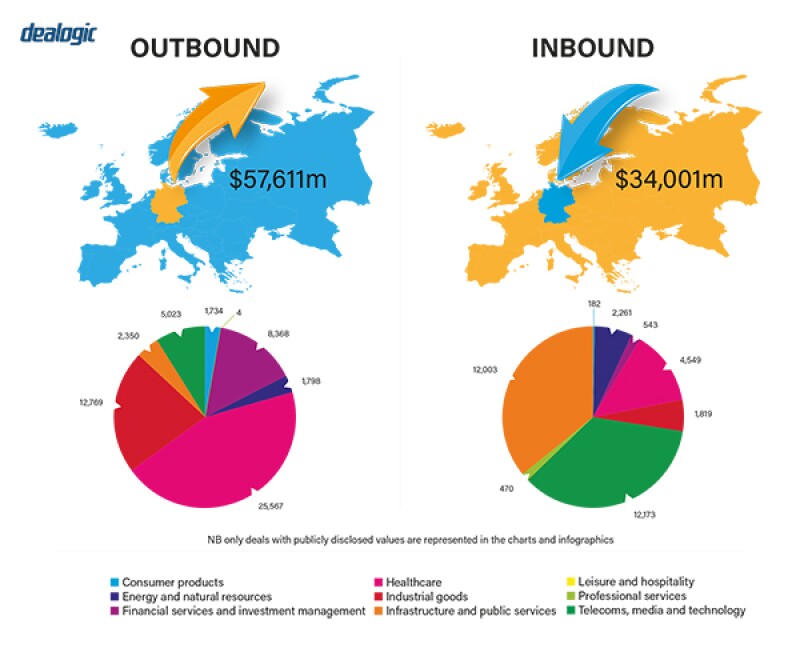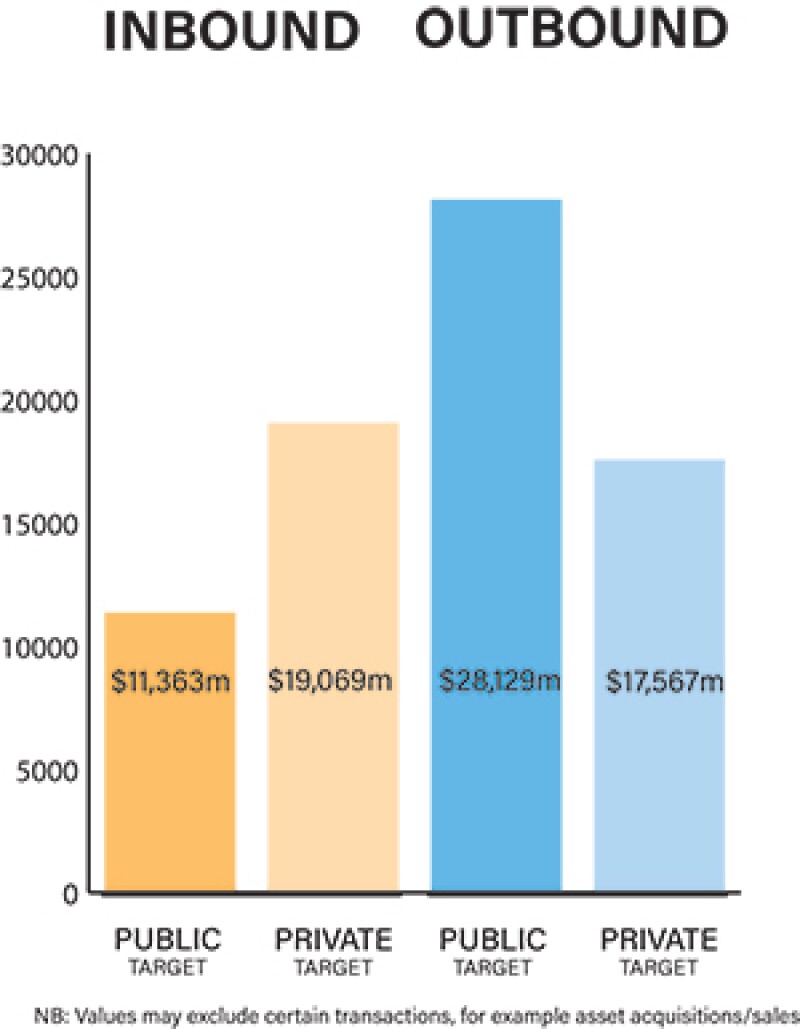After a severe slowdown of deal activity in the first half of 2020, the German market now appears quite resilient despite the challenges resulting from the COVID-19 pandemic. Potential buyers nonetheless remain cautious, more than ever aiming for a fair assignment of risks. Thus, there has been a noticeable increase of minority investments and joint ventures. Cross-border, as well as domestically public M&A transactions have also received growing interest from private equity (PE) investors.
Public and private M&A both play an important role in German transactional practice. Private deals often dominate the market as the number of listed companies is not as big as in other markets and there are some peculiarities to the German law that make the full integration of a listed company complex and difficult to assess from a financial perspective.
The spin-off of Siemens Energy from the Siemens Group and its subsequent listing in the prime standard of the Frankfurt Stock Exchange is a good example of a deal structure that has been encountered more often in recent months and which will likely continue to be attractive under COVID-19 restrictions. The transaction comprised a spin-off of the energy business to a newly established company, Siemens Energy, that has subsequently been listed on the Frankfurt Stock Exchange.
COVID-19 and recovery plans
There is a clear shift by businesses to move towards digitalisation, a progression that would likely spur M&A activity by companies seeking to improve their capabilities in this space.
The substantial capital markets activity that the technology industry has seen will also impact the M&A process. In particular, companies that view the IPO road as a credible alternative to a sell-side liquidity event can use this leverage to drive better terms in an M&A event.
The trend towards increased public M&A activity is confirmed by the notable rise in dual-track and even tri-track processes. Growth equity also rose significantly, as Europe's start-up scene further matures. In the US, the tech industry has also seen a rise in the number of direct listings and special purpose acquisition company (SPAC) transactions. It remains to be seen whether these trends will also manifest in Germany.
|
|
One of the drivers in M&A for the next few years will be distressed M&A |
|
|
The healthcare and life sciences (HCLS) sector also experienced strong deal activity throughout 2020 despite the uncertainties caused by the COVID-19 pandemic. This trend, which had already started before the pandemic outbreak, has only accelerated due to the disproportionately large impact that the virus has had on certain other sectors of the economy (e.g. logistics, real estate, automotive, hotels/travelling).
Corporates clearly focus on their core activities, spinning-off and carving-out business units that do not perform or support the main business. Further acquisitions of minority stakes in listed companies, including by way of private investment in public equity (PIPEs), are also on the rise.
One of the drivers in M&A for the next few years will be distressed M&A. Not only financial investors are revisiting old targets to spot distressed assets, but also activists are increasingly focusing on capital structure imbalances, vulnerabilities, and management responses to the pandemic. So far, activist investors have been relatively quiet, however, they have quietly accumulated equity positions, and larger corporates continue to be seen as value plays.


Legislation and policy changes
Acquisitions of private companies are primarily structured as share deals and are in principle not governed by a legislative offer process but are rather a matter of negotiation between the respective bidder and seller as most of the applicable general rules of the civil and corporate law is not mandatory.
Public M&A transactions on the other hand have to comply, inter alia, with the German Securities Acquisition and Takeover Act (WpÜG), the Market Abuse Regulation (Marktmissbrauchsverordnung) and the German Stock Corporation Act (AktG). Furthermore, public takeovers are subject to the supervision of the German Federal Financial Supervisory Authority (BaFin).
The Federal Ministry of Economics (BMWi) has the power to review direct or indirect acquisitions of voting rights in German-based companies by foreign investors. The BMWi may prohibit a transaction or request commitments if it poses a threat to German public order or security or violates essential national security interests.
In addition, public and/or private M&A transactions that are deemed a concentration may be subject to German merger control.
As distressed M&A market will be one of the drivers in M&A for the next few years, the Act on the Further Development of the Restructuring and Insolvency Law (SanInsFoG) that the German legislator passed on December 17 2020 is of utmost importance. It implements a wide catalogue of restructuring instruments offering debtors the opportunity to implement a restructuring concept with the support of a majority of creditors against obstructing creditors. Many of the companies currently in distress actually only face liquidity or over-indebtedness problems; their core business is intact and will remain so after the COVID-19 pandemic. Under the new legislation, restructuring can be carried out in a minimally invasive manner and potential investors need not fear hold-out value creditors when it comes to financial restructuring.
The Digitalization Act, which entered into force on January 19 2021, substantially extends the scope of German antitrust law to tackle presumed enforcement challenges in the digital economy and raises merger control thresholds across all industries. The Digitalization Act is the 10th amendment of the German Competition Act (GWB), the so-called 'GWB10'. Among other important changes, the current merger control thresholds have been substantially raised in order to relieve (mid-sized) companies from notifying transactions of minor economic importance.
Finally, foreign investment control has been tightened and carefully assessed, in particular by non-EU parties in certain key sectors.
M&A decision-making is influenced more and more by environmental, social and governance (ESG) matters when evaluating investment opportunities. ESG has reached an inflection point, with boards of directors, investors and other market participants and observers focusing on questions regarding corporate purpose and recognising the critical importance of environmental, social and governance factors in the sustainability and long-term value creation potential of the corporation and, ultimately, broader economic prosperity.
Market norms
In the majority of private M&A transactions, shares in a German limited liability company (GmbH) are sold by way of a share purchase agreement (SPA). The disposal of GmbH shares requires notarisation of the SPA including all annexes which in fact means that the notary public must read out loud the SPA in front of the parties involved.
Depending on how complex the transaction is, this may be a rather lengthy exercise that needs to be interrupted each time one of the signing parties leaves the room or talks on the phone. Therefore, it is customary to have authorised representatives to sign the documentation.
Depending on the deal structure, it is highly advisable to seek employment and tax law advise early in a German M&A deal as German law provides some unique peculiarities in these legal practices.
Law firms are using artificial intelligence (AI) tools more and more, i.e. to conduct due diligence in M&A transactions while also using e.g. project management and translation tools to assist with a smooth transaction through to closing.
Electronic and digital signatures and digital transaction management platforms, such as DocuSign, are making it easier to execute M&A transactions. It enables parties to review the final documents and sign electronically, which can overcome significant logistical issues for complex global transactions where parties are in difference locations and time zones. However, most of the German private M&A transactions involve the transfer of GmbH shares that require notarisation and thus is currently not eligible for electronic signature.
Public M&A
A shareholder holding at least 30% of the voting rights in as listed company has 'control' over the company according to German takeover law.
The scope of legal documentation required for the assumption of shares in a public company depends on the type of business combination chosen, i.e. reorganisations and mergers, acquisitions of a certain stake or a public takeover, or cooperation models as well as on the type of shares being acquired (namely bearer shares, registered shares, etc.) and whether these shares were bought over the stock exchange, subscribed for in connection with a capital increase or bought from other shareholders. Depending on the structure of the transaction, more documentation than only a purchase agreement may be required.
A public tender offer requires an offer document governed by German law. Unsolicited takeover attempts are still rare in Germany, however, the general attitude with regard to hostile transactions is less negative than it was in the past. Private and institutional investors increasingly encourage stock corporations to focus on shareholder value as liquidity and transparency of capital markets have developed.
After the decision to launch an offer has been published, the management board must not take any action that could prevent the success of the takeover offer. However, the following actions of the management board (including defensive measures) are permitted, without approval of the shareholders' meeting:
Searches for a 'white knight';
Any action within the scope of the management board's powers if approved by the supervisory board and if the law (e.g. the AktG) does not set forth further requirements; and
Actions that would have reasonably been taken if no offer had been launched, for example, measures in the ordinary course of business, measures to execute contractual obligations entered into before the bid or measures executing the established strategy of the target company.
Furthermore, the shareholders may, under certain restrictions, authorise the management board to take actions within the scope of the powers of the shareholders' meeting before and independent from any takeover offer.
The BaFin takes a rather restrictive position regarding offer conditions. Voluntary public takeover offers are usually subject to regulatory approvals, fairly standardised market- and company- material adverse changes (MACs) and no defensive measures, such as capital increases during the offer period, being taken. There is often a minimum acceptance threshold. Mandatory offers, i.e. those triggered by reaching a minimum 30% shareholding, can only be subject to regulatory conditions.
Break fees in public M&A deals, when the target pays the prospective buyer, have traditionally been unpopular in Germany and few target companies or bidders are willing to accept a break fee.
Private M&A
According to the Latham & Watkins 2020 Private M&A Market Study (the study), which examined over 260 deals signed between July 2018 and June 2020, 47% of deals included a locked-box mechanism, 25% of deals included a completion accounts mechanism and 28% of deals did not provide for price adjustment. This trend is consistent with results from the previous four editions of the study and reflects the seller-friendly nature of the European M&A market until COVID-19 emerged in March 2020.
Thereafter, buyers found pricing deals using locked-box mechanisms far more challenging given the significant changes seen in company earnings and the lack of reliable financial forecasts. Whether Germany–under the given circumstances–returns to the prevalent usage of completion accounts remains to be seen.
|
|
The market for exits still remains resilient |
|
|
The number of deals that featured an earn-out remained limited at 18% (albeit an increase of 4% from the previous study) according to the study. Earn-outs are less popular with PE sellers. However, as valuation uncertainties continue, earn-outs may serve as a means to unlock the gap between buyers and sellers, although COVID-19 disruption and many of the challenges that made valuation tricky during deal negotiation are likely to remain during the earn-out period. Therefore, careful specification of financial performance metrics is essential.
The study also revealed the continued limited use of escrows in private M&A deals (19% of deals surveyed, a third successive year of escrows featuring in 20% or less of deals), and a steady use of warranty and indemnity (W&I) insurance (45% of German deals). For deals that were signed in the first half of 2020, there was even an increase in the prevalence of escrows to 25%, reflecting changing business conditions and ongoing COVID-19-related uncertainties.
Private M&A transactions are typically subject to:
Merger control clearance by the Federal Cartel Office or the European Commission; and
Foreign investment control clearance by the BMWi.
Further deal conditions, if any, depend on the transaction specifics.
SPAs relating to German targets are usually governed by German law and are subject to the German courts unless the parties have agreed on arbitration. For cross-border deals, depending on the role and strength of the parties involved, purchase agreements are frequently governed by German law but may alternatively be subject to the laws and courts of another jurisdiction.
However, German law applies a twofold approach, i.e. the purchase agreement determines the framework under which the shares are sold whereas the transfer agreement determines how and when title to the shares actually transfers to the buyer. While the parties are generally free to choose the governing law for the purchase regulations of a transaction, the actual transfer of the shares must be governed by German law.
Due to the remaining uncertainties of the COVID-19 pandemic, there is no reliable valuation basis that consequently makes appropriate pricing very difficult for all parties involved. Whereas strategic investors implement risk sharing structures such as earn-outs for acquisitions, these are impracticable for PE exits, which call for the distribution of funds.
Under the current circumstances, nobody sells who is not forced to sell. Appropriate pricing is hardly possible without a reliable basis for valuation. Therefore, PE follows a 'buy and build' strategy to create value by pursuing COVID-19 related opportunities. Implementing such an approach takes time and therefore requires longer holding periods.
IPO exits are on the rise, more so than trade sales but secondaries have factually dropped off. With regards to the exit environment, the market for exits still remains resilient, with sellers seeking an IPO (or merger with a SPAC) or sale to realise their investment; in some instances, sellers employ dual-track exits to give greater certainty that an exit will occur.
Looking ahead
Strategic investors have and will continue to pursue transactions to improve their competitiveness in an increasingly digital and rapidly changing world. To face the uncertainties caused by the COVID-19 pandemic, companies will continue to review their portfolios and dispose non-core assets as well as unprofitable business units by way of spin-offs or carve-outs. The proceeds will likely be used for investments in innovation, digitalisation and disruptive technologies. The disposed assets on the other hand continue to attract PE investors in hope for superior returns on a stand-alone basis.
Despite COVID-19, PE firms are still sitting on a huge amount of dry powder for which they seek investment opportunities. Starting already before COVID-19, PE investors have proved to be more flexible with regard to investment structures. In an aim to mitigate COVID-19-related uncertainties, it is expected that there will be significantly more minority shareholdings and co-investments.
The uncertainty about the short and long-term consequences of the pandemic and the respective influence on the business of potential target companies cause high insecurity with regard to reliable company evaluations. This will and already has inevitably influenced transaction structures, i.e. re-participations, earn-outs and vendor loans will be on the rise to bridge evaluation uncertainties.
It is projected that PE firms will not act on the sell side as often as in the past so that so-called 'secondary transactions' will significantly decrease until the market and the portfolio companies have stabilised. A lot of companies struggle hard due to the COVID-19 crisis so that competition for healthy and promising targets among PE investors but also between PE and strategic buyers will markedly increase.
Click here to read all chapters from the IFLR M&A Report 2021

Nikolaos Paschos
Partner
Latham & Watkins
T: +49 211 8828 4647
Nikolaos Paschos is a partner in Latham & Watkins' Düsseldorf office and the local chair of the firm's German corporate department. He advises clients on corporate law, M&A, and related capital markets matters.
Nikolaos advises public companies and their boards on general meetings, shareholders' litigation, activist and stockholder matters, and corporate governance. As one of the leading corporate and M&A lawyers in Germany, he is regularly ranked in leading legal publications, including IFLR1000.
Nikolaos regularly writes and publishes on corporate and takeover law, notably the 2016 Paschos/Fleischer 'Handbook on Public Takeover Law (Handbuch des Übernahmerechts)'.

Sebastian Goslar
Counsel
Latham & Watkins
T: +49 211 8828 4658
Sebastian Goslar is a counsel at Latham & Watkins. He advises German and global public companies as well as financial investors on corporate transactions, capital markets, and corporate governance.
Sebastian regularly helps clients navigate public M&A (including defence), public company representation issues (including stock corporation and (corporate transformation law), corporate governance/compliance, and capital markets compliance and transactions.
Sebastian provides clients pragmatic and efficient advice, drawing on his broad experience with more than 150 transactions. He writes frequently on corporate and takeover law, including in the 'German Public M&A Handbook (Handbuch Übernahmerecht nach dem WpÜG)'.


